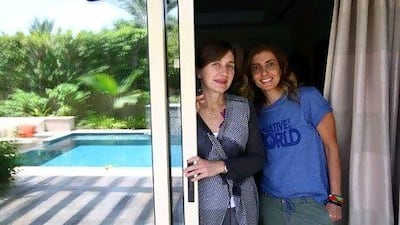The little boy can barely contain his excitement. He stands at the end of his bed, arms wrapped around a pile of toys and sweets that comes up to his dimpled chin.
"Say thank you," his mother prompts. He giggles, says, "Shukran" and follows it with a glorious smile.
Mohamed, seven, has been counting the days to this moment. It isn't his birthday and it isn't a feast day. It is Tuesday.
That is the day the Candy Cart comes to Dubai Hospital paediatric ward and the highlight of his week.
All of the children in the ward are desperately ill, some of them terminally so. By necessity, almost every moment of their lives is defined by the illness that brought them here and its treatment.
So the weekly arrival of the Candy Cart, laden with goodies there for the taking, is a welcome respite.
Dana Askari knows all too well just how much this matters. She brought the concept to Dubai Hospital last December. She did so with the encouragement of a childhood friend, Janine Freiha, and for the most personal of reasons.
Askari's daughter, Dania, died on June 21, 2010. She was one week shy of her 13th birthday.
In April 2008, Dania was diagnosed with rhabdomyosarcoma, a relatively rare cancer that develops in the body's connective tissue and accounts for about 3 per cent of childhood cancers.
The family have lived in the UAE for 19 years, but Dania and her mother travelled to New York for her treatment in the pioneering Memorial Sloan-Kettering Cancer Centre.
"I left my husband, Hasan, my son, Ali, then 15, and my youngest, Badr, who was just 18 months old, behind in Dubai," Askari says. "All I could think about was Dania."
More than a year of chemotherapy and radiation therapy followed. For a while the treatment appeared to be working. Askari says: "We came back to Dubai, returning to the US every three months for a check-up."
But in March 2010, a check-up uncovered chemotherapy-induced leukaemia. Dania had to have a bone-marrow transplant. The operation was a success, but the intensive chemotherapy that preceded it proved too much. Dania contracted veno-occlusive disease, a complication that results in liver failure.
Askari's voice falters: "Dania went in dancing and laughing - and she never came out."
For a moment Askari sits in silence as tears streak down her face. Then, with a shake of her head, she continues: "You would think that as a mother going through this, the last thing you'd want would be to go back to a world of cancer. But how can I not do this when I know that sometimes the only thing that brought my daughter happiness was Frank's Candy Cart?"
Askari is referring to Frank Tucciarone, who brought the Candy Cart to the Memorial Sloan-Kettering Cancer Centre's paediatric cancer ward 20 years ago.
Even when Dania was too sick to eat the sweets he brought; even when she was in isolation and had to emerge from her sterile cocoon in gloves and a mask, avoiding all human contact while she made her selection; even then the Candy Cart brought something joyful, something that belonged not to illness but to childhood.
"It's so simple but so powerful," Askari says. "I knew that I wanted to do something after Dania died. I told Janine about it and she pushed me to do it."
A friend donated the hostess trolley that the women decorated with brightly coloured buttons and paint. In the beginning they brought only lollies and snacks - chemotherapy affects the sense of taste and patients undergoing treatment often prefer salty, sour foods.
Then they noticed how young the children were and added toys, DVDs and craft kits to the weekly shop that costs about Dh4,000 of their own money.
At first the cart was met with suspicion as staff and parents assumed that they were selling rather than giving away the goods.
"There is nothing like this in the UAE," Askari says. "So it took a bit of explaining."
They also needed to negotiate some bureaucracy: "We had to have an umbrella organisation to get permission to go into the hospital. We're so grateful to Friends of Cancer Patients for being that."
Eventually Askari and Freiha hope to see a Candy Cart in public hospitals across the Emirates. More ambitious still is Askari's dream of bringing Child Life Teams to the UAE. These are groups of social workers, volunteers and paediatric psychologists dedicated to supporting children undergoing treatment.
"The teams do everything from yoga to music to bringing in clowns and making the children laugh," Askari says.
"I know what it meant to me and I saw what it meant to Dania."
Again emotion threatens to overwhelm her as she says: "What we are doing puts a smile on children's faces. I'm sure there are many women out there who would love to help.
"For myself I know that Dania would not want me to sit idly by when I could be doing that," she says.
For more information about Dana Askari's Candy Cart initiative, contact the Friends of Cancer Patients by e-mail, info@focp.ae, or call 06 506 5542.

